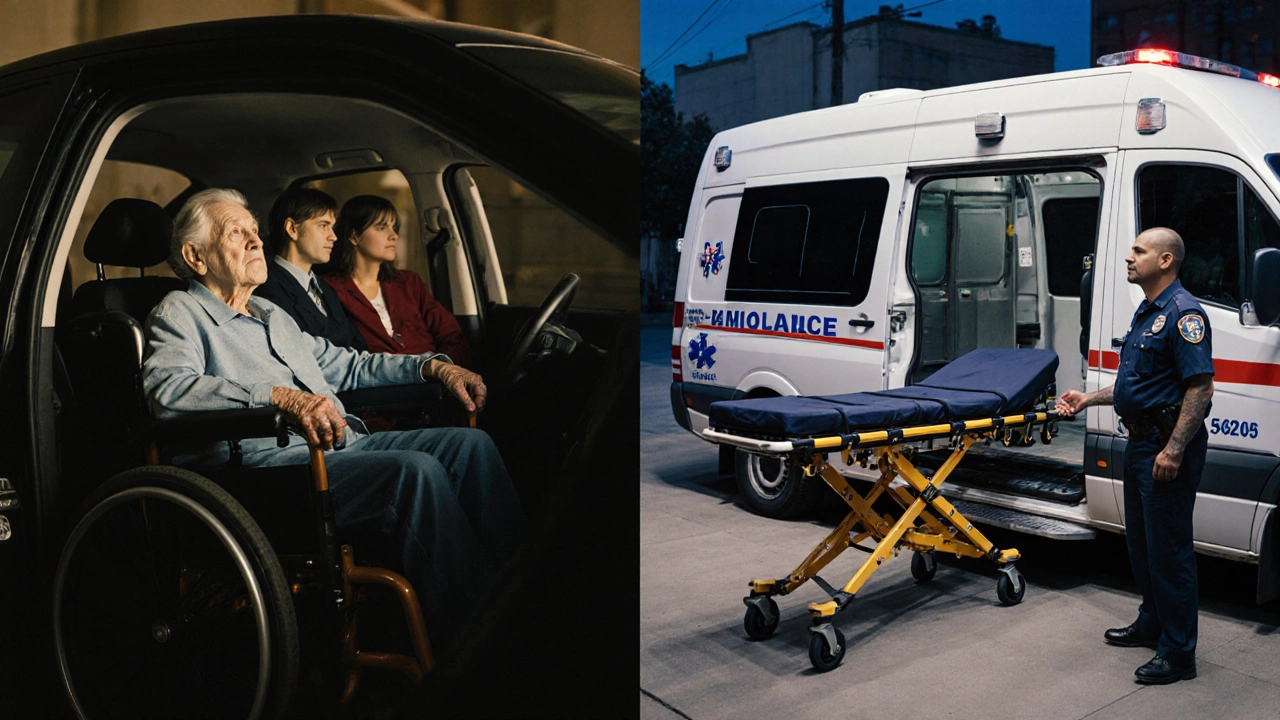When a loved one needs to travel for medical care - whether it’s a senior parent flying home after surgery, a child with special needs moving between hospitals, or an elderly relative being transferred across states - the logistics can feel overwhelming. But one of the most overlooked parts of the process? The cost of medical escort services. Families often assume it’s covered by insurance or that it’s just a fancy taxi. It’s not. And not planning for it can leave you stuck with surprise bills that hit hard.
What Exactly Is a Medical Escort Service?
A medical escort service isn’t an ambulance. It’s not a private jet with a doctor on board. It’s a trained professional - often a nurse, paramedic, or certified medical transport aide - who travels with a patient to ensure their safety, comfort, and medical stability during transit. They handle oxygen tanks, IV drips, mobility aids, medication schedules, and emergency response if needed. They’re with you from door to door: from hospital bed to airport gate, through security, onto the plane or train, and finally to the receiving facility.
These services are used when a patient can’t travel alone due to physical weakness, cognitive impairment, chronic illness, or recent surgery. Think: someone recovering from a hip replacement who can’t sit upright for hours, a dementia patient who gets lost in crowds, or a dialysis patient needing scheduled treatments en route.
How Much Do Medical Escort Services Actually Cost?
There’s no single price tag. Costs vary wildly based on distance, medical needs, mode of transport, and location. But here’s what families actually pay in 2025:
- Domestic ground transport (under 500 miles): $800-$2,500
- Long-distance ground (500-1,500 miles): $2,500-$6,000
- Domestic air transport with escort: $5,000-$15,000
- International medical escort: $12,000-$35,000+
Why such a big range? A patient needing only a wheelchair lift and someone to help them to the bathroom costs far less than someone requiring continuous IV medication, ventilator support, or cardiac monitoring during transit. The more complex the medical needs, the higher the staffing and equipment costs.
In Australia, a typical domestic air escort from Perth to Melbourne for a stable but non-ambulatory patient runs about $8,500. In the U.S., the same trip might cost $10,000-$12,000 due to higher labor and regulatory costs. International trips - say, from the U.S. to the Philippines - can easily hit $25,000 when you factor in customs, visas, medical clearances, and international flight charters.
What’s Included in the Price?
Not all providers are transparent. Some quote a low base rate and add fees for everything else. Always ask for a written breakdown. Here’s what you should expect to be included:
- One-on-one medical attendant for the entire trip
- Medical equipment (oxygen, portable ventilators, IV pumps, monitors)
- Specialized transport vehicle (wheelchair-accessible van, stretcher-equipped car)
- Flight coordination and airport assistance (wheelchair services, priority boarding, customs help)
- Medication management and administration
- 24/7 communication with receiving medical team
- Documentation and medical records transfer
Watch out for hidden fees: baggage handling, overnight stays for the escort, tolls, parking, or last-minute route changes. Some companies charge extra if the patient needs to stop for a medical appointment en route. Get everything in writing - and ask for a cap on additional charges.
Does Insurance Cover Medical Escort Services?
Most private health insurance plans - including Medicare and Medicaid in the U.S. - do not cover non-emergency medical transport unless it’s deemed medically necessary by a doctor and pre-approved. Even then, coverage is often limited to ground ambulance services, not air transport or dedicated escorts.
Medicare Part B may cover ambulance transport to the nearest facility, but not for elective transfers or long-distance travel. Some private insurers offer limited coverage under “transportation benefits,” but only if the patient is enrolled in a managed care plan that includes it. Always call your insurer and ask: “Does my plan cover non-emergency medical escort services for planned medical transfers?” Don’t assume - get it in writing.
Long-term care insurance is your best bet. Many policies include transportation benefits, especially if the patient has been certified as needing assistance with daily living. Check the policy’s “benefit schedule” - some pay $50-$150 per day for transport, up to a lifetime cap.

How to Budget Realistically for Medical Escort Services
Don’t wait until the day before the transfer to start planning. Here’s how to build a realistic budget:
- Get a medical assessment: Ask the patient’s doctor to write a letter stating the medical necessity for an escort. This helps with insurance appeals and provider quotes.
- Get 3 written quotes: Don’t pick the cheapest. Ask for itemized quotes from at least three providers. Compare what’s included.
- Add a 20% buffer: Unexpected delays, weather, or medical changes happen. Budget for at least 20% more than the highest quote.
- Check for financial aid: Nonprofits like the National Patient Travel Center or the Air Charity Network offer free or reduced-cost transport for low-income families. Some religious groups and community organizations also help.
- Use a medical travel specialist: Companies like MedEvac or Angel Flight connect families with vetted providers and can negotiate rates based on need.
For example, a family in Perth planning to fly their 82-year-old mother to Sydney for a specialist appointment budgeted $9,000. They got three quotes: $8,200, $8,900, and $9,500. They chose the middle option, added a $1,800 buffer for possible delays, and ended up spending $10,700 - which was still under their total budget.
When to Avoid Medical Escort Services
Not every patient needs one. If your loved one is stable, mobile, and mentally alert - even if they’re elderly - they may not need a medical escort. A simple wheelchair service at the airport and a family member accompanying them might be enough.
Also avoid escort services if:
- The patient’s condition is unstable and requires emergency transport (call an ambulance instead)
- The trip is purely for convenience, not medical necessity
- You can’t verify the provider’s credentials (ask for RN or EMT certification)
Some companies operate as “medical transport” but are just hired drivers with no medical training. Always ask: “Is your escort a licensed nurse or paramedic? Can I see their certification?”
Real Stories: What Families Wish They Knew
One family in Brisbane thought their mother’s Medicare would cover her flight home after a stroke. They paid $11,000 out-of-pocket when the claim was denied. They later found out a nonprofit could have helped for $2,000.
Another couple in Adelaide hired a cheap escort service to fly their son with cerebral palsy to Melbourne. The escort had no experience with ventilators. He had a seizure mid-flight and they landed in a regional airport because the escort didn’t know how to respond. Their son was fine - but the trauma and cost of the emergency landing added $6,000 to their bill.
These aren’t rare cases. In 2024, the Australian Health Transport Association reported over 200 complaints about unqualified escorts and hidden fees.

How to Find a Reliable Medical Escort Provider
Start with your hospital’s social work department. They often have a list of vetted providers. You can also check:
- Australian Health Transport Association - lists accredited providers
- Medicare-approved transport services (if applicable)
- Nonprofit networks like Angel Flight or Patient Airlift Services
- Online reviews - look for patterns, not just ratings. Are people complaining about untrained staff? Late arrivals? Hidden fees?
Ask for references. Call the last three clients. Ask: “Did the escort know how to handle [specific condition]?” “Was the final bill what they quoted?” “Would you use them again?”
What to Pack for a Medical Escort Trip
Don’t leave it to chance. Prepare a medical travel kit:
- Current medications (in original bottles) with dosing schedule
- Doctor’s contact info and medical summary
- Insurance card and emergency contact list
- Comfort items: pillow, blanket, favorite music, snacks
- Portable oxygen if needed (check airline rules)
- Copy of advance directive or power of attorney
Give this to the escort before departure. And never let the patient travel without a copy of their medical records - digital or printed.
Final Thoughts: Don’t Guess. Plan.
Medical escort services aren’t a luxury. For many families, they’re the only safe way to move a vulnerable loved one. But they’re expensive, complex, and often misunderstood. The families who handle this well are the ones who start early, ask hard questions, get everything in writing, and never assume someone else will cover the cost.
If you’re facing this decision, treat it like planning a major surgery - not a taxi ride. Budget like your loved one’s safety depends on it. Because it does.
Are medical escort services covered by Medicare?
Medicare Part B only covers emergency ambulance transport to the nearest facility. It does not cover non-emergency transfers, air travel, or medical escorts for planned medical appointments or long-distance moves. Most families pay out-of-pocket unless they have long-term care insurance or qualify for a nonprofit program.
How far in advance should I book a medical escort?
Book at least 2-4 weeks in advance, especially for air transport. Providers need time to coordinate flights, secure medical clearances, and assign qualified staff. Last-minute bookings often cost more and may not have the right medical personnel available.
Can I use a regular taxi or rideshare with a family member instead?
Only if the patient is stable, mobile, and doesn’t need medical support during transit. If they require oxygen, IVs, monitoring, or help with toileting or positioning, a regular taxi won’t cut it. Untrained companions can’t respond to emergencies, and rideshares aren’t equipped for medical gear. The risk isn’t worth the savings.
What’s the difference between a medical escort and an air ambulance?
An air ambulance is a fully equipped medical aircraft with a pilot, paramedic, and doctor on board - used for critical, life-threatening cases. A medical escort flies on a commercial airline with a trained nurse or EMT who monitors the patient. Air ambulances cost $25,000-$100,000. Medical escorts cost $5,000-$15,000 for domestic flights. Choose based on medical need, not cost alone.
Can I pay for medical escort services with HSA or FSA funds?
Yes. The IRS considers qualified medical transportation expenses eligible for Health Savings Accounts (HSA) and Flexible Spending Accounts (FSA). Keep receipts and a letter from your doctor stating the medical necessity. This can help offset out-of-pocket costs.
